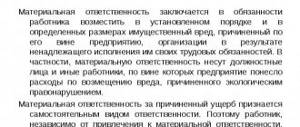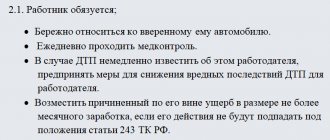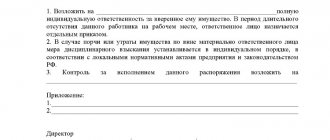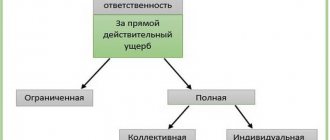Normative base
Each employee in the process of work uses various material resources belonging to the employer.
Typically these are goods, cash, equipment, tools, transport, computer and office equipment. After transferring inventory items to an employee, sometimes things get lost, break, or stop working. If property is damaged due to the fault of a subordinate, the employer’s natural desire is to receive monetary compensation for losses from him. But simply deducting the amount of damage from wages will not work, since the issue of financial liability of employees is regulated by Chapter 39 of the Labor Code of the Russian Federation, which also spells out the procedure for imposing punishment. Read more: How to develop a statement of employee responsibility in an organization
Types of liability
To resolve the issue of bringing an employee to punishment, remember that financial liability in the Labor Code is divided into:
- full and limited;
- individual and collective.
| Limited financial liability of the employee | Full financial responsibility |
| In an amount not exceeding his average earnings (Article 241 of the Labor Code of the Russian Federation) | In full (Articles 242 - 245 of the Labor Code of the Russian Federation) |
The Labor Code imperatively restricts the employer from placing full financial responsibility on personnel, protecting a conscientious employee from abuse by superiors. In this regard, it is necessary to remember:
- Bringing an employee to financial liability is a right, but not an obligation (Part 1 of Article 22, Article 240 of the Labor Code of the Russian Federation). The employer has the right to refuse to recover damages in full or in part.
- The terms of the employment contract and local regulations cannot worsen labor rights in comparison with those established by current legislation. Imposing financial liability on employees by including such a clause in the text of the employment contract and job description is being challenged in court as contrary to the labor legislation of the Russian Federation.
- Bringing an employee to liability is permitted only if there are grounds established by Article 238 of the Labor Code of the Russian Federation, taking into account the restrictions established by Article 239 of the Labor Code of the Russian Federation (due to force majeure; due to normal economic risk; due to extreme necessity or necessary defense; due to lack of appropriate conditions for storage of entrusted property).
- The subordinate is obliged to compensate only for direct actual damage, that is, a real decrease in property or deterioration in the condition of property, including the property of third parties, if the employer is responsible for its safety. The concept of direct damage also includes costs that the company must incur, or excessive payments for the acquisition, restoration of property, or compensation for damage caused by the employee to third parties.
- When limited financial liability is introduced, the amount of average earnings within which the employee pays for damages is calculated from the amount that remains after withholding taxes from wages (letter of the Ministry of Health and Social Development of Russia dated November 16, 2011 No. 22-2-4852). According to Part 2 of Article 139 of the Labor Code of the Russian Federation, when calculating the average salary, all types of payments provided for by the payment system that are used by the employer are taken into account, regardless of the sources of these payments. The average salary is calculated based on the salary actually accrued to him and the time actually worked by him for the 12 previous calendar months.
IMPORTANT!
As a rule, a limited liability agreement (a sample of which is developed independently in free form) is not concluded with employees, since this is not necessary. This type of liability is already provided for by the provisions of Article 241 of the Labor Code of the Russian Federation.
Terms of attraction
Article 238 of the Labor Code of the Russian Federation assumes that the guilty employee is obliged to compensate the employer only for direct actual damage caused to him. Lost income (lost profits) cannot be recovered from the employee.
Direct actual damage includes:
- a real decrease in the employer's cash assets;
- deterioration of the condition of such property (including property of third parties owned by the employer);
- the need for the employer to incur costs or pay funds for the acquisition, restoration of property or compensation for damage to third parties.
According to the law, an employee’s financial liability is excluded in the event of damage due to force majeure, normal economic risk, extreme necessity or necessary defense, or the employer’s failure to fulfill the obligation to provide adequate conditions for storing property entrusted to the employee.
If the manager was stingy in equipping the warehouse with proper locks and did not restrict access to third parties, then it will not be possible to recover the shortage from the storekeeper.
Normal business risk - in what situations can it not arise?
In modern legislative norms, the official term “normal economic risk” has not been established. This is why many employers may regularly have questions about how to determine the appropriateness of this risk. It should be noted that such a risk can indeed be justified by the employer if the following basic conditions are met:
- The employee took absolutely all actions within his power in order to have any influence on the current situation and at least somehow mitigate it.
- The employee had absolutely no other available means to complete the assigned tasks.
- All actions of the employee were performed by him within the competence assigned to him and did not at all contradict the current legislative norms, as well as internal local acts of the enterprise.
Information regarding the procedure and some features of recognizing an existing risk as justified is contained in the provisions of criminal law, namely in Article 41 of the Criminal Code of the Russian Federation. It says that risks can indeed be considered justified if the result obtained could not be achieved by any other means. In addition, this article pays special attention to such an issue as ensuring the safety of other citizens. In particular, the validity of the risk will also be confirmed if the person responsible for the risk has taken all necessary measures to ensure an adequate level of safety for other citizens. If one or more of the above points are violated, the risk cannot be considered justified.
What should an employer do?
The procedure for bringing an employee to financial responsibility is established by the Labor Code, and deviation from these rules threatens the employer with recognition of his actions as illegal. Even if it is proven that the employee is guilty of causing harm. To recover damages from an employee, the employer must:
- establish the amount of loss and the reasons for its occurrence, creating a special commission for this purpose, if necessary;
- require the employee to provide a written explanation for the damage incurred. If he refuses to give an explanation, draw up an appropriate act;
- within 1 month from the date of final determination of the amount of loss, issue an order to recover from the guilty employee the amount of damage caused not exceeding his average monthly earnings.
Please note that if the month period has expired or the person does not agree to voluntarily compensate for the loss caused to the employer, and the amount to be recovered from the employee exceeds his average monthly earnings, then recovery is carried out through the court.
Circumstances excluding the employee’s financial liability
Financial liability does not occur if the cause of its occurrence was:
- Force majeure circumstances (extraordinary or unpreventable events).
- Necessary defense.
- Identity threat.
- Failure by the employer to fulfill the conditions to ensure the safety of property that was entrusted to the employee (according to Article 239 of the Labor Code).
Provisions of Art. 240 of the Labor Code provide for the employer’s right to decide on his own whether to hold an employee financially liable and give him the right to refuse to collect compensation in whole or in part.
Recovery of damages in the absence of an administrative offense
Case No. 1
The company filed a lawsuit to recover material damage from A. in the amount of 120,000 rubles. At the court hearing, it was established that A. was hired as a driver, and an agreement on full financial responsibility was concluded with him. As a result of damage to the car caused by A., the company suffered damage in the amount of 120,000 rubles (repair cost).
By the court's decision, the claim was partially satisfied, and damages in the amount of 19,500 rubles (average monthly earnings) were recovered from A. Since the law does not provide for the conclusion of an agreement on full individual financial liability with the driver, then, in accordance with the requirements of Art. 241 of the Labor Code of the Russian Federation, A. is liable for damage caused only in an amount not exceeding his average monthly earnings. The plaintiff’s reference to the fact that the damage to the car was caused by a collision with a concrete support, which is a violation of traffic rules, was considered unfounded by the court, since the case of an administrative offense based on the fact of the accident was not initiated against A., and the corresponding resolution was not issued.
Full responsibility
While protecting the rights of the employer from abuse by unscrupulous employees, the legislator also provided for cases of full financial liability. According to Article 243 of the Labor Code of the Russian Federation, such situations refer to cases of full financial responsibility of the employee:
- Lack of valuables entrusted to the employee on the basis of a special written agreement or received by him under a one-time document. Receiving material assets using a one-time document presupposes the voluntary consent of the employee to carry out such actions.
- Intentionally caused damage. Evidence is required that the employee foresaw the consequences and desired them or was indifferent to them.
- If the damage was caused while under the influence of alcohol, drugs or other toxic substances. The resulting consequences are due to the state of intoxication, confirmed by the order of suspension, and witness testimony.
- Causing damage as a result of criminal actions of an employee established by a court verdict.
- Causing damage as a result of an administrative violation, if established by the relevant government body. There must be a causal connection between the administrative offense committed and the damage incurred by the employer.
- Disclosure of information constituting a secret protected by law (state, official, commercial or other), in cases provided for by federal laws, for example, No. 152-FZ of July 27, 2006 “On Personal Data”. An employee can be held financially liable only if the employer has taken all measures to protect such information in accordance with the procedure established by law.
- Causing damage not while the employee was performing his job duties. The key evidence is damage caused outside working hours or while performing work not stipulated by the employment contract.
- Establishment of full financial responsibility by an employment contract concluded with the deputy heads of the organization and the chief accountant.
Case No. 2
N. filed a lawsuit to invalidate the employer’s order to recover material damage from him. When considering the case, it was found out that N. worked as an adjuster and, when readjusting the machine, installed the stamp incorrectly, which led to the production of 1000 units of products, which were ultimately defective. According to accounting data, the cost of the damaged panels was 68,000 rubles. The employer issued an order to compensate for material damage in the amount of N.'s average monthly earnings with a monthly deduction of 20% from the salary.
N.'s claim was denied. The court indicated in the decision that the conditions and procedure for bringing to responsibility established by the current labor legislation were met by the employer, the provisions of Art. 241 of the Labor Code of the Russian Federation on the financial liability of employees for losses caused within the limits of average earnings, a monthly deduction of no more than 20% of the wages due is provided.
It is generally accepted that an employee is fully liable for damage caused to the employer only if two conditions are simultaneously met:
- a written agreement on full individual or collective (team) financial responsibility has been concluded with an employee who has reached the age of 18 and directly serves or uses monetary, commodity valuables or other property;
- the work performed and the position of the employee are included in a special list. The lists of jobs and categories of workers with whom it is permitted to conclude such contracts, their standard forms are approved by Resolution of the Ministry of Labor of the Russian Federation dated December 31, 2002 No. 85 “On approval of lists of positions and works replaced or performed by employees with whom the employer has the right to conclude written contracts on full individual or collective (team) financial liability, as well as standard forms of agreements on full financial liability.”
For financial consequences to occur, four components must be present:
- Direct effective damage has been caused.
- The employee's actions were found to be unlawful.
- The actions of the staff were found to be at fault.
- A cause-and-effect relationship has been established between illegal actions and direct effective damage.
If these four components are present, the employee becomes financially liable, including full liability, even in the absence of a corresponding agreement. And in this case, it is not limited to any limits and is reimbursed by the employee in full.
Thus, if an employee is directly entrusted with responsibilities for the maintenance, use and storage of material assets, the appropriate position and type of work performed must be indicated in the employment contract and job description. If it is impossible to differentiate the responsibility of each employee, the employer has the right to enter into written agreements on collective (team) financial responsibility with each member of the team. In this case, material assets are transferred to a group of people; each member of the team (team) will have to prove the absence of his guilt or determine the degree of his guilt by agreement between all members of the team (team) and the employer (in the case of voluntary compensation for damage). In court, the degree of guilt of each member of the team (team) is determined by the court (Article 245 of the Labor Code of the Russian Federation).
Read more: Employment contract with financial liability: when, with whom and why it is concluded
Failure to comply with the requirements of the law on the procedure and conditions for concluding and executing an agreement on full individual financial liability sometimes serves as the basis for releasing an employee from the obligation to compensate for damage caused through his fault in full, exceeding his average monthly earnings (decision of the Supreme Court of the Russian Federation dated November 19, 2009 No. 18 -B09-72).
Legal relations with the employer
Special legal relations regarding the financial liability of employers and employees begin after the employee commits a guilty unlawful act and the immediate occurrence of damage.
As a rule, the provision on reciprocity in relations regarding the financial responsibility of employees in the field of labor is fixed in a separate chapter in the employment contract for all workers in a particular field, which is the legal basis for the employee’s financial responsibility.
However, employers often enter into special agreements. According to the provisions of Art. 244 of the Labor Code of the Russian Federation , an agreement on financial liability is a separate annex to the employment contract, drawn up in writing , where the employee undertakes to bear full financial responsibility for any damage caused to the employer through his own fault.
IMPORTANT The legislator prohibits concluding such agreements with minors.
First of all, this type of agreement is provided for certain categories of workers, the list of which is approved in Resolution of the Ministry of Labor of Russia No. 85. Basically, these are employees who have been entrusted with conducting cash, credit, banking, financial transactions, as well as any other activities related to monetary and other valuables (cashiers, salespeople, warehouse managers, etc.)
First of all, in organizing the financial liability of the organization’s employees, management, in order to record the offense and assess the damage, must organize an inventory of official items and property in accordance with Order of the Ministry of Finance No. 34n, and then the management needs to form a special commission to begin an official investigation and inspection.
After the employer discovers damage to property, official items and valuables, he must, in accordance with Part 2 of Art. 247 of the Labor Code of the Russian Federation, require the employee to present an explanatory note in writing, where he must write the reasons for allowing such unusable state of things, property and valuables with a note about what measures were taken to reduce or eliminate the damage.
If an employee refuses to provide a document in writing, then the commission draws up a special act, which records his refusal to cooperate with management.
After receiving all the explanations, the commission evaluates the damage received in monetary terms based on the market price of things without any reduction in their actual value according to accounting documents, taking into account wear and tear.
Upon completion of the inspection, the employee can familiarize himself with all documents and inspection reports, and in case of any objections, appeal them.
REFERENCE mat the employee's responsibility is not diminished in the event of other types of liability and is always considered by the employer and the court separately in accordance with Art. 248 Labor Code of the Russian Federation.
Reducing the amount of damages recovered
Case No. 3
As a result of the warehouse inventory, a shortage of inventory items was identified. The employee (warehouse manager), who entered into an individual agreement on full financial liability, refused to compensate for the damage voluntarily. The employer filed a claim for damages in full. In accordance with Article 250 of the Labor Code of the Russian Federation, the body for the consideration of labor disputes is allowed, taking into account the degree and form of guilt, the financial situation of the employee and other circumstances, to reduce the amount of damage to be recovered from the employee. The amount of damage to be recovered from the employee is not reduced if the damage was caused by a crime committed for personal gain. When making a decision, the court took into account that the damage to the employer was caused as a result of careless accounting of property due to the inexperience of the employee; selfish motives for causing the damage were not established. From the case materials, it is clear that the employee’s age at the time of concluding the employment contract and the agreement on full financial responsibility is 22 years, the total length of service is 1 year, and there is a dependent minor child. Taking into account all the above circumstances, the court partially satisfied the employer’s claim, reducing the amount of recovery by 50%.
Case No. 4
The employer filed a lawsuit to recover from a group of employees the full amount of damage caused as a result of the electric forklift overturning. An agreement on full collective (team) financial responsibility has been concluded with the employees. The court found that such an agreement is prohibited from being concluded with the defendants, and therefore the agreement concluded with them is not the basis for holding them, as employees, to full financial responsibility. The employer did not provide any other grounds established by the Labor Code. The court partially satisfied the employer's claim - the amount of the employee's financial liability amounted to the amount of his average earnings.
How is the amount of material damage caused determined?
It is important to note that the amount of material damage is considered to be property lost in fact, that is, the amount of compensation will be calculated from its value. It is determined by market prices that apply in the area where the damage occurred. The average cost is calculated as of the day the damage occurred. In this case, the value of the property cannot be lower than indicated in the accounting data (taking into account the degree of wear and tear).
Please note: The employee is not required to pay for potential benefits that were lost due to damage.
Before making a decision to recover damages from an employee, the employer must conduct an inspection with the participation of specialists who are authorized to conduct this inspection. As a result of the inspection, the fact of causing material damage, the place, time, circumstances in which the damage was caused, the goals and motives of the employee, the presence of the employee’s guilt in the damage caused, additional aggravating or mitigating circumstances, the personal and business qualities of the employee must be established. The employee is required to provide written explanations to establish the cause of the damage. The employee must also be familiar with the results of the inspection, documented in the form of an investigation report into the circumstances of the damage. This act must contain the following information:
- The date when the act was drawn up;
- Information about the people who discovered the damage and drew up a report;
- Detailed information about the damage caused and the nature of its infliction (the report must indicate not only the damage itself, but also how it was caused);
- Assessment of the employee’s guilt and its nature. It is considered proven if intent or negligence on his part has been proven. If an employee could have prevented damage to the employer’s property, but did not do so without a good reason, then he will also be considered guilty.
The employee can review the inspection materials and, if necessary, appeal the results. At the same time, it is up to the employee to prove their falsity.
Is it permissible to reduce the premium amount?
To avoid unnecessary disputes with staff over a lost electronic pass or coffee spilled on a laptop or keyboard, the employer has the right to use other methods of influence, including financial incentives.
The wage regulations, as a rule, contain the grounds for accruing bonuses (additional payments, allowances) to the employee in the current month. Among such grounds for rewarding an employee, it is advisable in a local regulatory act to provide for careful treatment of the employer’s property, computer equipment, office equipment, and in the conditions of calculating bonuses, allowances, interest - the absence of disciplinary sanctions in the paid month. The procedure for calculating bonuses and the conditions for their payment are the prerogative of the employer. Thus, the employer receives a legal instrument of influence on personnel, avoiding the restrictions established by the Labor Code of the Russian Federation, encouraging conscientious employees who carefully treat the material assets entrusted to them.
More details: Discount of bonuses - we influence negligent employees.
Case No. 5
The plaintiff (employee) filed a lawsuit to declare the disciplinary sanction illegal and to recover the unpaid bonus. The employee, without properly fulfilling his duties, committed a violation of the law, which led to the imposition of a fine on the employer. The employer reprimanded and held the employee financially liable by reducing the bonus. The plaintiff's arguments that two disciplinary sanctions were imposed on her in the form of a reprimand and a reduction in bonuses were not accepted by the court. Article 199 of the Labor Code of the Russian Federation defines an exhaustive list of disciplinary sanctions; deprivation of bonuses or its reduction are not included in it. In accordance with the regulations on bonuses at the enterprise, it is determined that the amount of the accrued bonus is reduced by 50% for violation of the job description. The basis for reducing the premium is an order for the enterprise. Such an order has been issued for the enterprise. Having verified the legality of the grounds and compliance with the procedure for imposing a disciplinary sanction, the court rejected the claim.
When can an employer claim compensation for material damage?
In order to recover money from an employee as compensation for material damage, three conditions must be met in case of damage to the company’s property:
An employee is punished if he committed an illegal act or inaction that led to material damage to the organization. Accordingly, the employee is punished not only if a breakdown occurred as a result of his direct actions, but also in situations where he should have prevented the breakdown, but did not do so;- The action or inaction must be the fault of the employee. That is, it implies a person’s attitude towards a dangerous action, expressed in the form of intent or negligence. In other words, the employee will be guilty if two factors coincide: his action leads to damage to the employer’s property and this action is intentional or careless;
- A cause-and-effect relationship must be established between the unlawful act (or inaction) and material damage. Accordingly, the employer will need to prove that it was because of the employee that material damage to the organization’s property was caused.
If the employer is able to prove that material damage to the enterprise was caused precisely because of a specific employee, he can recover money in accordance with the Labor Code of the Russian Federation.










